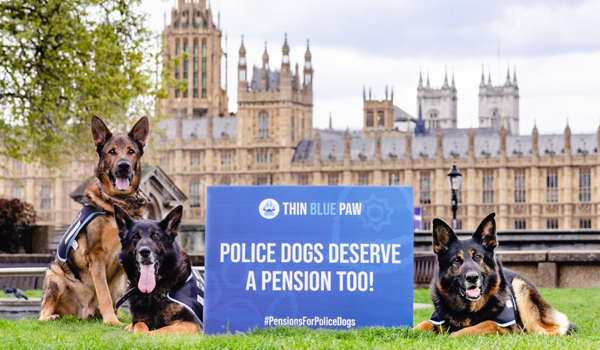Police dogs join charity to petition Parliament for pensions
A charity that supports police dogs when they retire has launched a campaign calling for pensions for all police service animals when they hang up their badges.
The Thin Blue Paw Foundation has launched a petition calling for the Government to introduce mandatory financial assistance for police dogs once they retire – or ‘police dog pensions’ – which will mean new owners are not left to face hefty vet bills for dogs which often come with health and medical conditions due to their strenuous working lives.
The Foundation supports retired police dogs across the UK and has, since launching in August 2020, provided grants totalling more than £380,000 for life-saving surgeries, vital medication, and regular therapy to ensure these canine heroes live long, happy and healthy retirements and receive the treatment they need for any medical conditions they suffer.
Thin Blue Paw Foundation chair Kieran Stanbridge said: “Police dogs give the best years of their lives to the job. They throw themselves into dangerous situations without a second thought, they show unwavering loyalty to their handler and their job, and they give so much to help fight crime and keep the public safe.
“During their careers they receive the very best care and support from the force they serve with but, as soon as they hang up their harness, they’re on their own, and the responsibility for their often-expensive care falls to their ex-handler or new owner.
“We believe that the Home Office who allocate funding to police forces nationally have an ethical and moral obligation to these dogs and shouldn’t turn their backs on them when it’s time to pay them back for everything they’ve done.
“That’s why we’ve launched our campaign today calling on the Government to introduce measures that ensure all retired police dogs receive support – or doggy pensions – when they retire.”
There are around 1,700 serving police dogs operating across the UK’s 45 police forces, and an estimated 100, on average, retire every year.
While the Thin Blue Paw Foundation will continue to support retired police dogs across the UK – which it has been doing since it was launched in 2020 – the charity’s trustees want to see policy change to secure the futures of these dogs and guarantee they can access the best in veterinary treatment, therapy and medication once they retire.
The charity has launched a petition and is urging the public to get behind the campaign, which would see the Government ringfencing budget to ensure a basic level of support to the retired dogs’ new owners to ensure they are not left with the significant financial pressures themselves.
Mr Stanbridge added: “Police dogs lead physically demanding lives and, when they retire – whether due to injury or age – they often have health problems as a result of their career, which can require expensive medication, therapy and management throughout their retirement.
“Taking on any dog is a responsibility, but taking on an older retired police dog with health problems is a huge commitment, particularly during the current cost of living crisis.
“We need to ensure that there is support in place for these heroic police dogs so that people aren’t put off the idea of rehoming them when they retire and so that owners are never faced with the heartbreaking decision of having them put to sleep because they can’t afford their treatment.
“Although we’ve worked with insurance companies over the last few years to help them launch special policies that are open to retired police dogs making it easier for owners to get insurance cover, it’s the Government’s responsibility to offer some ongoing support to these canine heroes once they hang up their harness.”
The Foundation says arthritis is the most common condition it helps owners treat and, based on an average of £200 each month for pain-relief medication, estimates that it costs around £2,400 a year more to care for a retired police dog than a normal pet dog of a similar age and breed.
Mr Stanbridge said: “These conditions are pre-existing so wouldn’t be covered by insurance even if their owners were able to get a policy and so owners are left having to bear the costs on top of all the normal costs of caring for a dog.
“These conditions are caused by the strenuous physical aspect of their role so surely the police should be helping to compensate for this?”


